Basil arrives
On the 17th of April 1964 our son Basil eventually appeared. Jane was in labour for twenty-four hours and I was able to be with her for what seemed like an eternity. In the end, the doctor decided Basil needed some encouragement and put a suction pad on his tiny head so that he could help by pulling. The result was that Basil emerged looking like a pixie with a pointed head, but it soon returned to its normal shape. I don’t know which of the three of us was most exhausted!
Here are a few highlights from letters to my mother, who died at 88 just after the 1968 Lambeth Conference began. She had suffered all her life from the after effects of rheumatic fever in her teens, but had raised three sons. She had cared for Dad since 1912 when Hong Kong encephalitis B destroyed his sense of balance. He was always mobile and by some miracle mentally unaffected. In the house, he relied on a primitive form of the Zimmer Frame called a ‘walking machine’; out on the road he used a tricycle chair propelled by two handles. From the time I was five, I used to accompany him for two or three hours every morning.
“17 April. Basil took some 24 hours to come into the world at 9.45p.m. in the old Zomba Hospital. He is a most scrumptious infant, has regained his birth weight in three days, with a greatness of very fair hair, a slightly sunburnt complexion (not all red and horrid but a pale tan) and now his head, about a foot long when he was born, has come back to his proper shape. He was assisted on the way out by a thing like a bicycle pump. Jane is fighting fit. Her only complaint is that Basil drops asleep halfway through his meals and drains port take-off point before beginning on the starboard one, so that she is becoming lopsided. The lawn is also lopsided as Jane got two-thirds of the way through mowing it when Percival, our cook, caught her and gave her a piece of his mind. In July, Basil made his first visit to Likoma Island, travelling overland with us through Mozambique. I reported that he was in momentary danger of being pulled limb from limb by Likoman mothers who had never seen a pink baby before. In September, I wrote ‘Basil is trying to crawl and full of fun. His trouble is that he gets stuck upside down in the middle of the night.’ By November, Basil was ‘mobile, with all the instincts of a juvenile delinquent but with an unfortunate charm and cheerfulness which makes it difficult to wield the heavy hand.’ In April 1965, we introduced him to the Lake. ‘He took a bit of time to get used to the vastness of the water-supply, as there was a strong wind and waves that tended to break over his head, but by Wednesday, he was so enjoying himself that we resolved to build him a sandpit in the garden. Mark II is due to arrive at the beginning of December. In September I was reporting, “Basil is a bit like a beached whale. He gets stuck upside in the middle of the night and can’t get back again. But he’s learning to crawl and is full of fun. The matins lessons are from Ecclesiastes, a horrible book mostly, but it has its moments like 4.9, added by the writer of Wisdom, “Two are better that one, for if the fall, the one will lift up his fellow ….. If two lie together, then they can have heat: but how can one be warm alone?” I am not sure I would dare the other one we ran into last month, but I’ll leave you to read it: Proverbs 5.11.
I had hardly been at home and had seen little of Basil since he was born in April 1964. We had to cancel our holiday so in October Jane and I and six-month old Basil were spending a few nights on nearby Zomba mountain. We took with us the few architects’ plans that we could lay hands on. There was not an architect left in the country, apart from those in the Public Works Department and for the first time there was a little money for the clergy houses, health centres and schools that were so desperately needed. This space would enable us to sketch out plans for buildings that could be afforded.
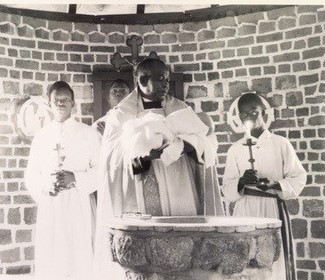
A few months later Nigel was baptised.
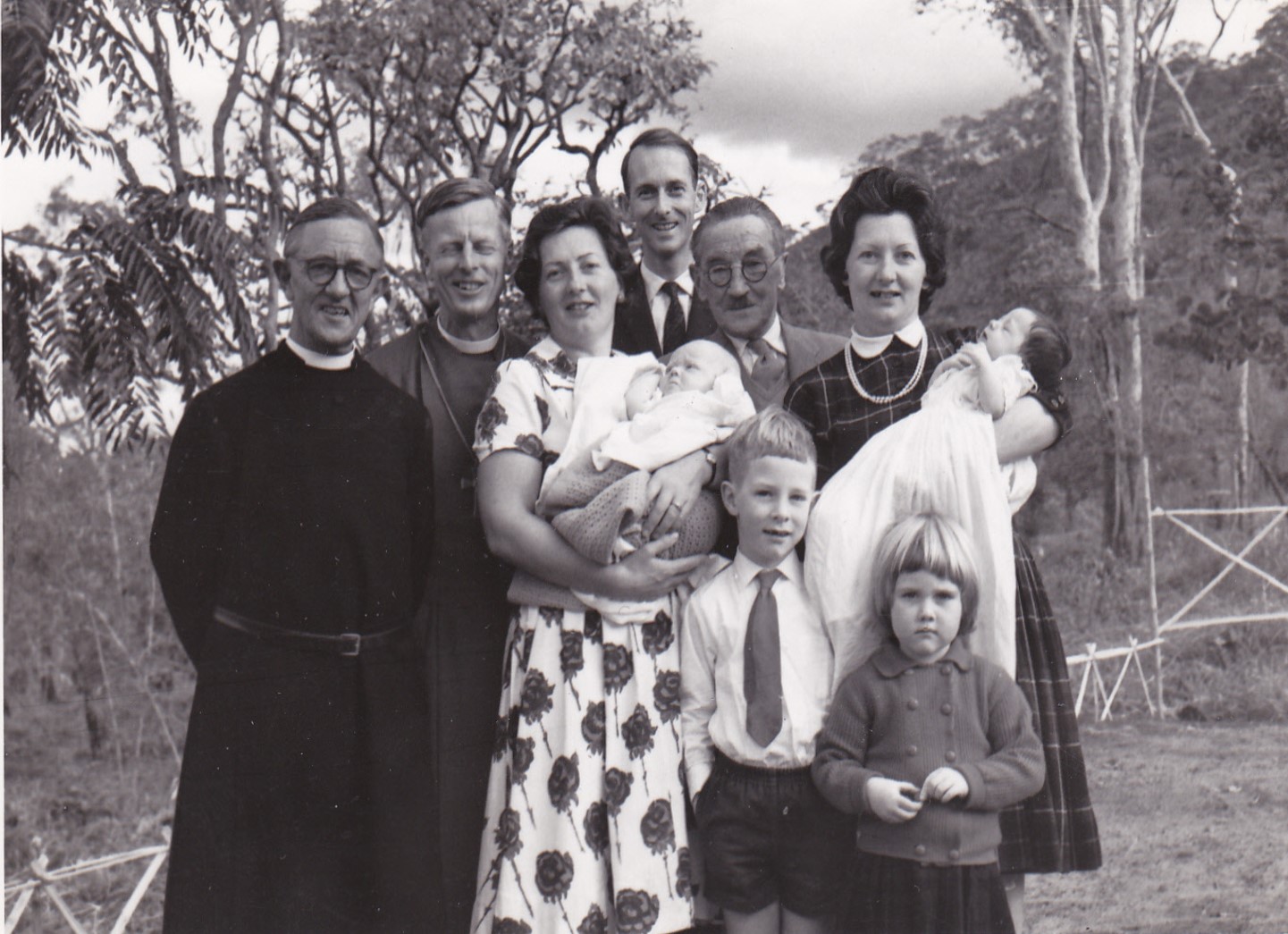
Archdeacon Christopher Lacey, Donald, Jane, Basil, Mel, Gerald Riddle (Jane and Brigid’s father) Julian, Brigid, Nigel and Nicola Crofton
In the small hours of Saturday morning there was a telephone call from Sir Glyn Jones, the Governor General. President Banda and he were both worried about the safety of Catherine, Henry Chipembere’s wife, her children and of his father Habil, the Archdeacon of South Nyasa. Would I go at once to Mponda’s, where Habil was now living, and persuade him to go to Likoma Island, and then to Malindi to persuade Catherine to go with him? A large Fisheries boat was on standby at Mponda’s and John Bolt, the District Commissioner, would accompany them to Likoma.
** There is more detail on this remarkable story in the Chapter 7 Diocesan chapter.
Letters to my mother, then aged 87, were important to her and contained snapshots of our life. Here are a few:
12 October: An original excuse from a candidate for being late for a confirmation at Matope last week. Half the congregation lives across the Shire River, just before it starts on 100 miles of rapids. “A hippo put its foot in our boat and pulled the oarsman into the water.” Fortunately, nobody was any the worse for wear. Francis Bell had one in his garden at Malindi which refused to go away, so he threw a bau-board at it – a massive wooden-board for a game a bit like the solitaire we used to play. It is played all over eastern Africa with beans or stones: a favourite game in the men’s ward in Pretoria. We should have had our annual round of unity talks at Chilema last week, but it was rather an anti-climax. Livingstonia Synod didn’t arrive – a car breakdown, we heard later. Blantyre Synod forgot to tell their team till the day before and it was too late for them to get off work. The Churches of Christ came in the afternoon, looking a bit bedraggled after fighting a bush-fire early in the morning that nearly wiped their centre out, saved by one of them throwing himself on a tin of burning aluminium paint in the oil-store that would otherwise have blown up all the diesoline drums and ignited the whole place which is all grass-roofed. However, we didn’t waste our time.It was a chance to work on the first edition of the Liturgy which is being printed in three editions: Nyanja, Nyanja-English and Yao-Nyanja on facing pages. An innovation this year at the Clergy retreat: We got Patrick Kalilombe, a brilliant Malawian White Father, to conduct bible studies with group discussions. The clergy were a little shocked at the idea but thought it was a good one when it was over. The RCs have had a bad blow when their most outstanding Malawian, doctor of canon law in the Gregorian University in Rome, left to get married. Many of the priests here are Dutch and with all the ferment going on in Holland about clerical celibacy, are shattered. 10.15: Adjourn to garage to confer on how to make a sun-printing frame for architectural prints (it worked well). Resume at desks. Complete final draft of new edition of Diocesan Liturgy: what is modern English for “Thou who takest” – you who take? You who takes? Fill in a very German form of several pages of small print to get the hydro-electric project working here at Malosa. 14.00: J off to hospital to see how the building of the A-frame Guardians’ kitchen she designed is progressing. (Guardians are relatives of patients who stay at the hospital and provide food for their sick ones) Arranges hospitality for twenty-two members of Standing Committee, due to meet in our house; back to check work at Hotblack House. The house named after Gerry Hotblack, soldier, schoolmaster, strawberry-farmer, who at 76 has turned missionary and is building himself a house across the dam from ours. His daughter Joan has come to look after him and our accounts at the same time. D is busy unloading on to her the accumulated accountancy problems.
Christopher arrives
Over a year later, in November 1965, I wrote:
The garden delights Basil. He delights in irrigation and the harvesting of Cape gooseberries, without too much damage to clothes or digestion. A less useful activity is playing darts with labels of cuttings on the back verandah. We are still on the nursery slopes of gardening – labels in one hand, text-book in the other – and the results could be alarming. If the oyster-nut vine, which grows 20 feet in six months, finds itself labelled as alyssum, we might need another house. 3 December 1965: We are now four! Christopher Donald weighed in last night at 8lbs 13 ozs, gloves on, ready for the fray at 9.05 p.m. Thanks to three midwives, one doctor and one husband – none of whom were really necessary. Personal data: fat as an Eskimo, dark brown hair, dark blue eyes far apart like Jane’s. Kind of wide, in fact about square in contour. Kicks a great deal, both before and after birth. Favourite posture: like Rodin’s ‘thinker’, with chin in hand, following you round with eyes. Glad to have him as ten days overdue. A crisis was threatened if he came in the middle of Diocesan Standing Committee, the following week-end, for which members had travelled hundreds of miles. A bit scary as the doctor at Zomba, a recent import from Scotland, is said to be an alcoholic and that anyone stitched after 7.00 p.m. is likely to be stitched together permanently as his hand shakes so much. Art Johnson, our Diocesan doctor, who’d been out at health centres in the country, arrived five minutes before the birth and did the necessary tailoring. We think Basil will take the situation all right. He’s been wandering into the spare bedroom for a week or two, looking at the cot and saying, “Baby!” He'll be glad to have another boy to play with. Jane has been persuaded she can’t really come home and look after twenty-two guests for the Diocesan Standing Committee meeting and I have pockets full of notes on how to stuff peppers.
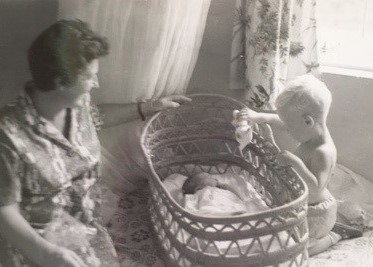
Early years
2 January 1966 (from Jane): Basil’s bath now goes on indefinitely and I don’t know who enjoys them most – Donald or Basil.
11 January 1966: Someone going on leave left Jane his light motorbike. She tears about Malosa on it, to Basil’s delight. When he hears her coming home he pretends to grip the handlebars and shouts, “Mummy – tu-tu-tuu!” Susan and Paul Cole-King have been staying with us for a week with their three and a half children – good training for Basil having all his toys pinched.
Basil is quite sweet with Christopher and will hardly let him out of his sight. If he cries at the other end of the house, we all have to go and investigate to keep him quiet. He’s very interested that we put the mosquito net on C’s crib every night. If not, he trails around with it saying, “Skeeto baby!”
29 January 1966: Christopher was with us at Provincial Synod in Blantyre. It only took him a day to realise that if he opened his mouth, somebody would shove something into it. Basil enjoyed himself with his cousins in Zomba and wasn’t in the slightest bit upset at being away from home or us.
24 February 1966: Last night Christopher didn’t settle and Jane went in at 3.00 a.m. to give him some sustenance and found him crawling with army ants. One in a hundred is bigger than the rest and gives a nasty nip – the others are harmless, they just crawl over you. This morning the whole house is being drenched with dieldrin.
Last week we were down on the Lower River to see a Catholic hospital with Art and Nan Johnson and the boys. On the way back, we came to a river in full flood because of a storm in the hills. We waited half-an-hour for it to fall but as it was still rising, we turned back – but a smaller river we had already crossed had risen two feet. The villagers were most sympathetic and gave us a room in a new house being built for the court president. The ten of us squeezed in. Basil thoroughly enjoyed himself and trotted off the next morning to see a cow being milked and the pigs, piglets, ducks, pigeons, dogs and cats which had kept up a chorus through the night. He was especially taken by the sow and her litter just underneath our window.
17 May 1966: Basil is well into the cheeky stage. At dinner he offered me chunks of pineapple with a sweet smile, but when I got to my plate, popped them into his own mouth.
5 June 1966: Government has just said that European children may not attend Malawian schools so the boys will not be allowed to attend Malosa Secondary School. But Blantyre is too far for them to travel. We have problems.
24 July 1966: In spite of warnings from Art Johnson about terrible diseases that can be caught from sand-pits, we have had one built. Basil and the gardener’s little boy, Chikonde, spend hours in it. Last weekend it kept the boys and the Crofton family quiet for the whole day – well worth the masses of sand when they undress.
31 August 1966: Christopher now snakes along the floor at a tremendous pace. He went through the agonizing days when he could stand up but not sit down and bellowed until he collapsed. Now he bobs up and down very happily. Basil plays all day with Chikonde – good that he has a playmate and that he is the younger and therefore by no means gets his own way all the time.
17 October 1966: Christopher now pushes a chair around the khonde at great speed and doesn’t often fall over. The two of them get on well together. Basil seizes every opportunity of feeding Christopher.We have to be careful he’s not jamming a worm down C’s ever open mouth.
21 October 1966: The humiliation when we found Basil age two and a half knew more Chichewa than we did – his one-upmanship revenge for his parents’ spelling out in English words they didn’t want him to understand!
8 January 1967: (On our return, following time in Birmingham initiating the new Diocesan link and a brief holiday in Spain before picking up the ship in Trieste to take us to Beira). The boys are still slightly confused about having two look-alike mummies. Basil asked Brigid, “Mummy, where’s Mummy?” Christopher shoots all over the garden on all fours and has stood for a record 5 seconds without holding on to anything.
28 January 1967: We leave in five minutes for Nkhotakota, taking Basil on his first long trip since he was a little baby. Christopher is doing everything except walking. He has an extraordinary crawl with legs straight and body up in the air like a baboon. He can get about as fast as an adult so perhaps doesn’t feel the need to walk. He is enormously strong physically. The khonde chairs he climbs on to by just putting one foot on the seat and hauling himself up. He will stay with Brigid and Mel and their children in Zomba while we are away.
6 June 1967: Basil has now had four nasty attacks of asthma which leave him and Jane exhausted. Each time they last for two or three days of gasping for breath. We are lucky in having a good doctor at hand, Art Johnson, or it would have been frightening.
Christopher has been walking for some months now. He is a tough little thing. He has had a stye in one eye which gives it a drooping look, like a prize-fighter who has been worsted, but it doesn’t seem to worry him. He has a passion for motor-cars and the only two words he can pronounce are “car” and “lolly”. We are planning to build a simple guest-house for diocesan staff on the lakeshore at Kaphiridzinja, near where we spent our honeymoon. None of the staff can afford expensive holidays and it would be a great boon for everyone.
24 June 1967: So grateful to Felix for the prescriptions. None of them are available in Malawi but Jane’s father has tracked them down in Salisbury. Basil began a cold ten days ago and we immediately gave him antihistamines and tranquillisers so that he only wheezed for half an hour and avoided an asthma session. Christopher is a solid little fellow and struts about all over the place, usually in the direction of the water taps!
28 July 1967: Felix’s medicines are doing Basil a power of good and have stopped him going into spasm.
5 October 1967: Christopher says quite a few words now and thumps Basil if he doesn’t approve so they’re beginning to be companions for each other! Basil climbed up a ladder and was walking around on the roof the other day – a bit shattering but we’re pleased he’s developing self-confidence while Christopher can climb out of his cot, wreck the cupboard drawers and climb back again without anyone knowing.
26 October 1967: 6.30 Mass in the little chapel in our house. Query: is it a reason against the westward position that one’s first-born sprawls on the steps leading into the chapel and makes faces at his father?
12.15 – Lunch interrupted by screams from Christopher who has discovered a nest of stinging ants on the lawn. Remove clothes and ants and comfort with Maltesers.
4.00 – Basil lays out sweetcorn plantation, properly contoured. Donald says, “Stamp firmly on the seed, then fill the furrows with water. Basil fills furrows with water, then stamps. Both have mud-bath followed by conventional variety.
6.30 – Donald reads to Basil and Christopher about animals of Africa. Basil has them divided up into good and bad. Leopards are good because they eat baboons who are bad because they steal our bananas.
6.40 – Come to fish-eagle in the book. “There’s my good eagle that brought me my chambo!” This refers back to a Sunday breakfast on the lakeshore when a thoughtful fish-eagle delivered an enormous bream on the ground beside Basil.
14 December 1967: (Jane) Basil and Christopher always have a good half hour with Donald reading to them before they go to bed – not sure who enjoys it most, him or them!
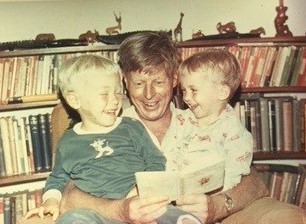
29 March 1968: Christopher, who had an operation for a hernia two weeks ago, spent Saturday afternoon rolling down the grass slope in front of the house, interspersed with fights with Basil for possession of the tricycle they were given at Christmas. The stitches still had to be taken out in spite of all this and he is as chubby as ever. Sorry, no photos of the children, my camera was pinched by a passing white guest.
22 April 1968: Christopher has developed another hernia now on the other side! While we were in Zomba, Basil joined Nigel in going to the Nursery School. He bellowed to begin with but by the end of the week quite enjoying it. Continued to go after our return to Malosa, with the Leak and Lane children. It is now the middle of the school holidays and Basil keeps asking when he will be back at school again. Christopher has developed a splendid lisp – we try to get him to say words beginning with ‘s’ just to hear it! He’s a wonderful comic.
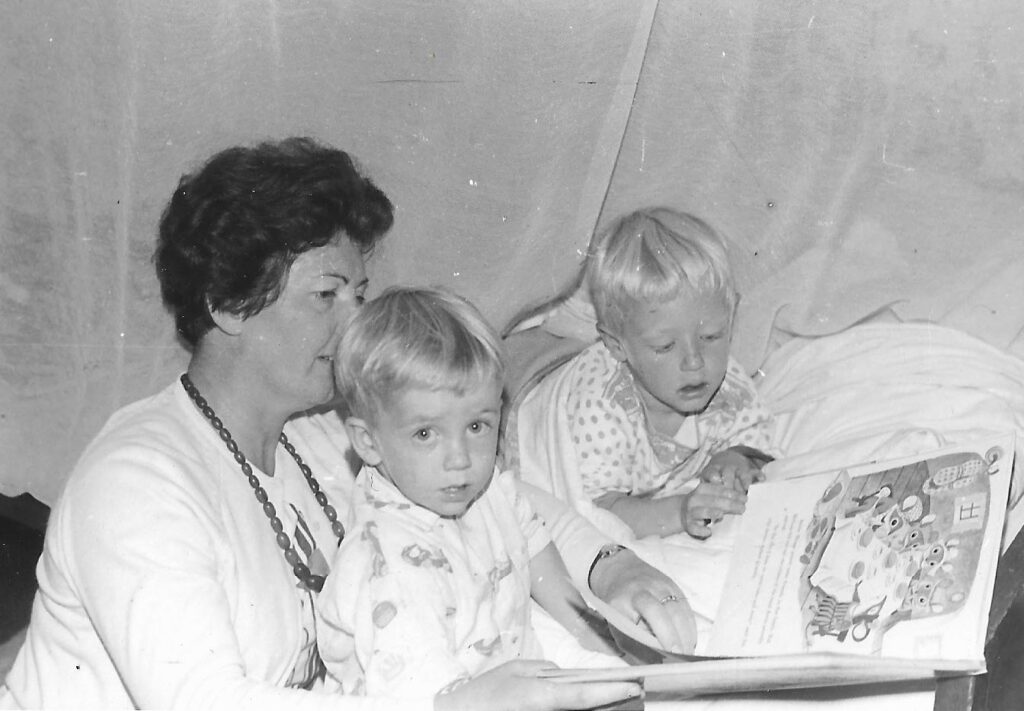
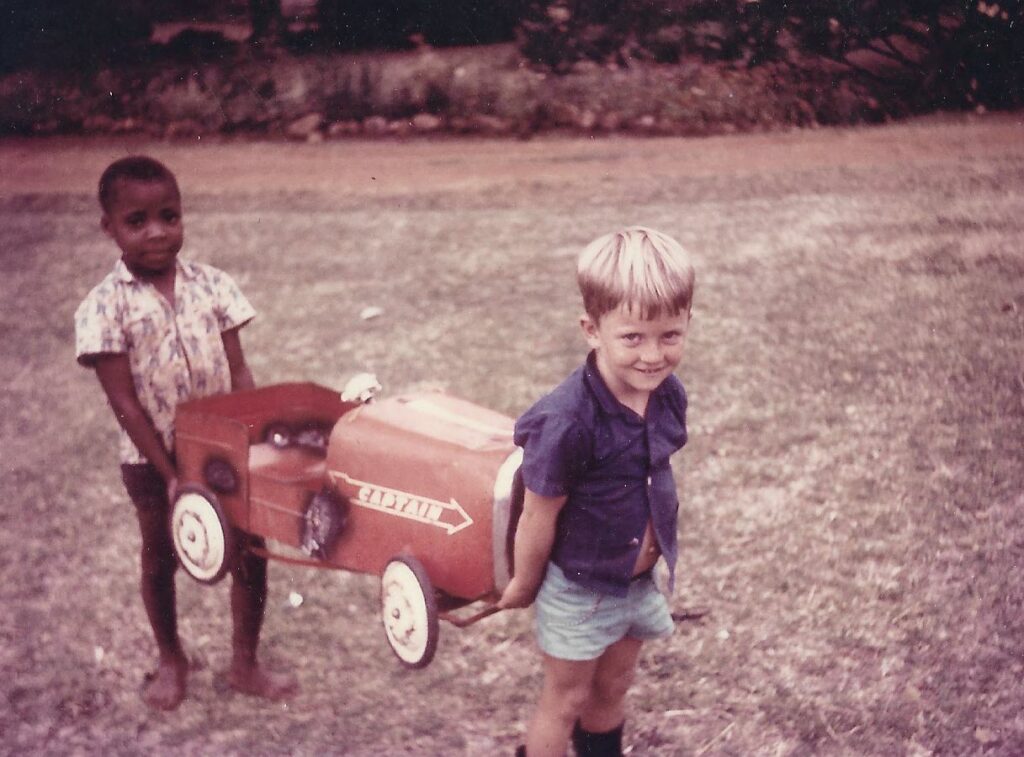
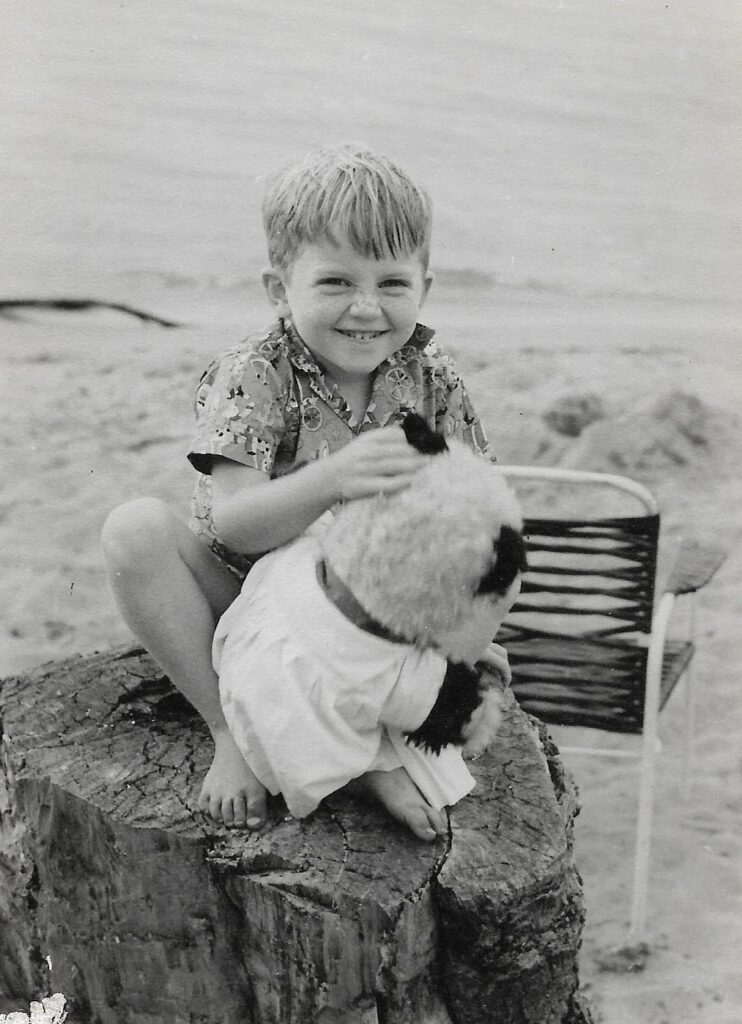
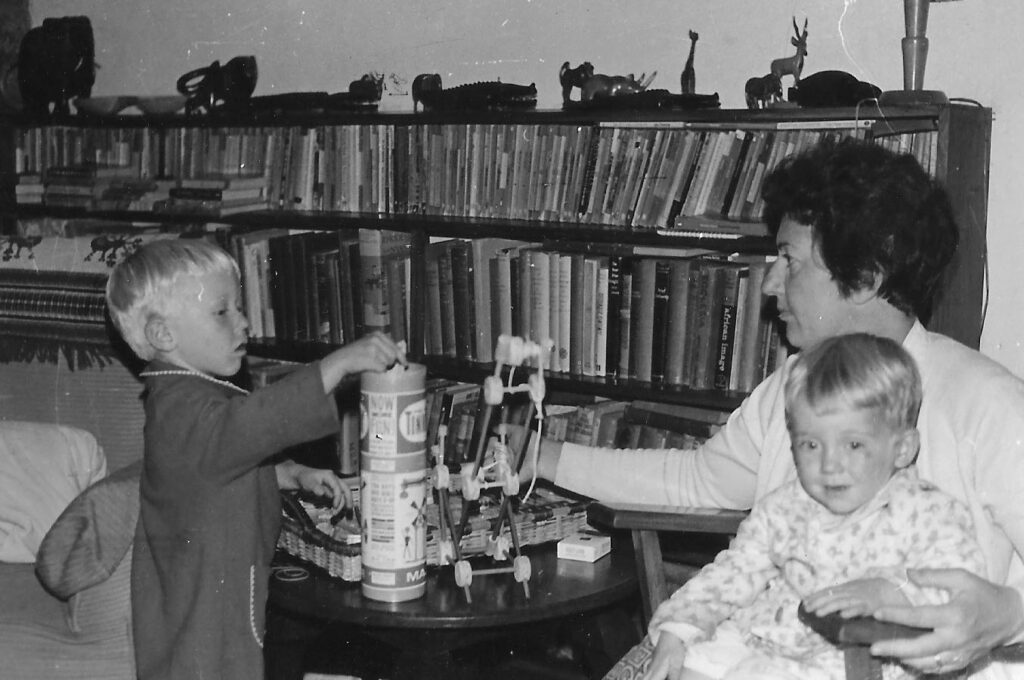
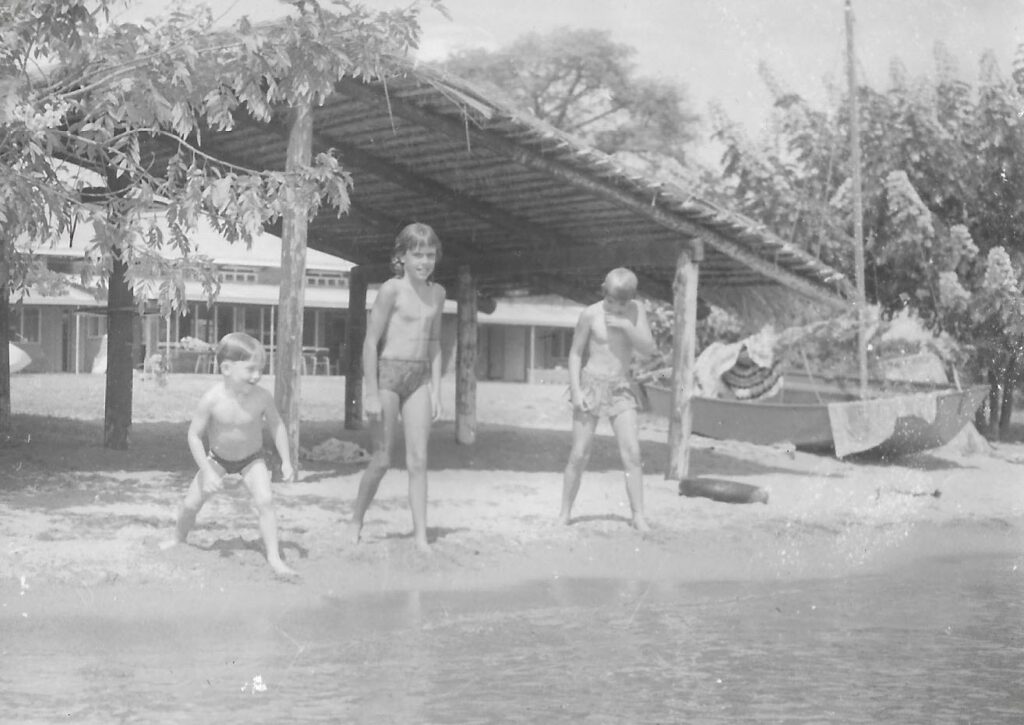
Excerpts from letters to my motherExcerpts from letters to my mother:
Basil and Christopher are growing frantically – busy on outward bound courses in the garden at the moment – they have swings, a slide and rope-ladders rigged up under the trees. The garden is thriving again – the delicate little coral creeper on the front khonde off again, the yesterday-today and tomorrow bush covered with mauve, lilac and white flowers in turn, and the pale blue plumbago we thought had died come back to life again. We have several boxes full of flamboyant tree seedlings, ready for planting at the lakeshore diocesan cottage.
For our Christmas letter, we fitted the close-up lens and recorded just one of the days of our life we happened to be together:
04.30: D struggles out of bed to tape-record an eagle-owl snoring in the big tree outside the bedroom – act of reparation for two mornings ago when the machine wouldn’t work and he missed a ground hornbill, a huge, grotesque bird like a turkey, unusual in these parts.
06.30: Mass in the little chapel at the end of our house. We use the 1964 Liturgy which is having a hard time recovering from the title attached to it A Liturgy for Africa, which has made Africans unhappy – ‘Why only for Africa?’
07.15: Breakfast. Tot up the different birds seen yesterday in the garden: thirty-two, but J cheats by adding four more heard but not seen. Christopher joins in the fun: “bird” – rush for glasses to find he is pointing at a plate bought in Athens with a stork on it.
18.00: D plans a vernacular course for expatriates, including self. Overhears Basil having an argument with playmate Sayikonde, our gardener’s son. Decides instead to take Basil on as tutor.
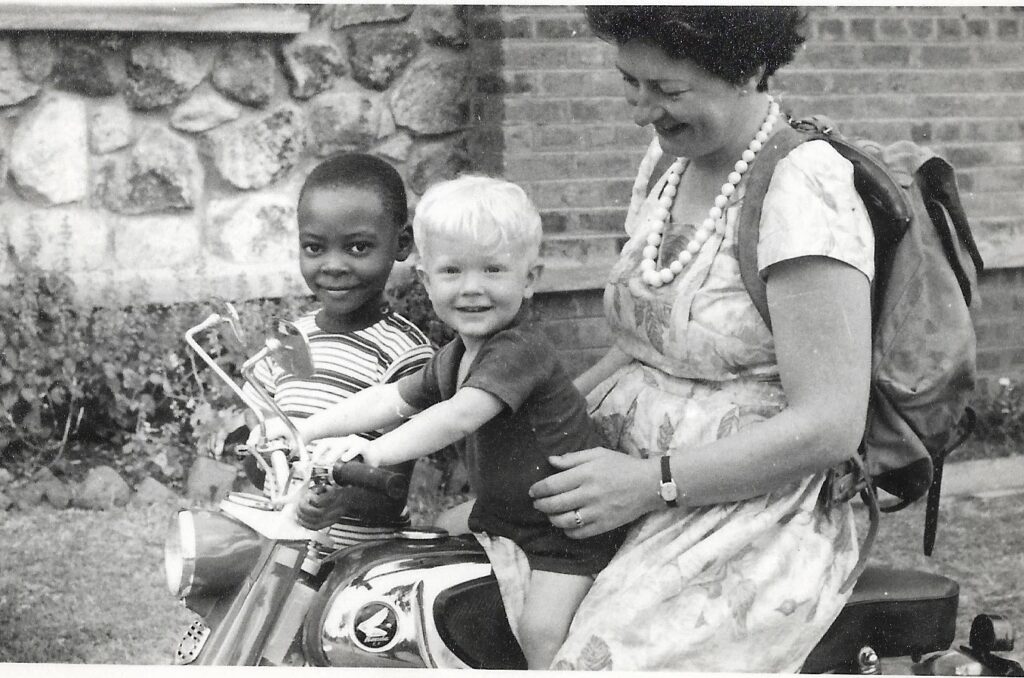
While I was at the Lambeth Conference we solved the problem of inter-communication between Jane and myself with a tape-machine. Donald was certainly the only member of Lambeth who could lighten the views of the Archbishop of Sydney on women by plugging in what he hoped would be mistaken for a hearing-aid and listening to his son and heir rendering ‘Baa-baa blacksheep!’
I arrived back in Blantyre five hours late, just as the welcome-home party was dispersing. The five-hour wait was amply justified in Basil’s eyes by me arriving in a real super VC10 jet instead of a dirty old Viscount.. It was a great joy to find that Basil, who had been plagued with asthma since he was a small baby, was now a different boy, thanks to new medication prescribed by a remote control specialist in London.
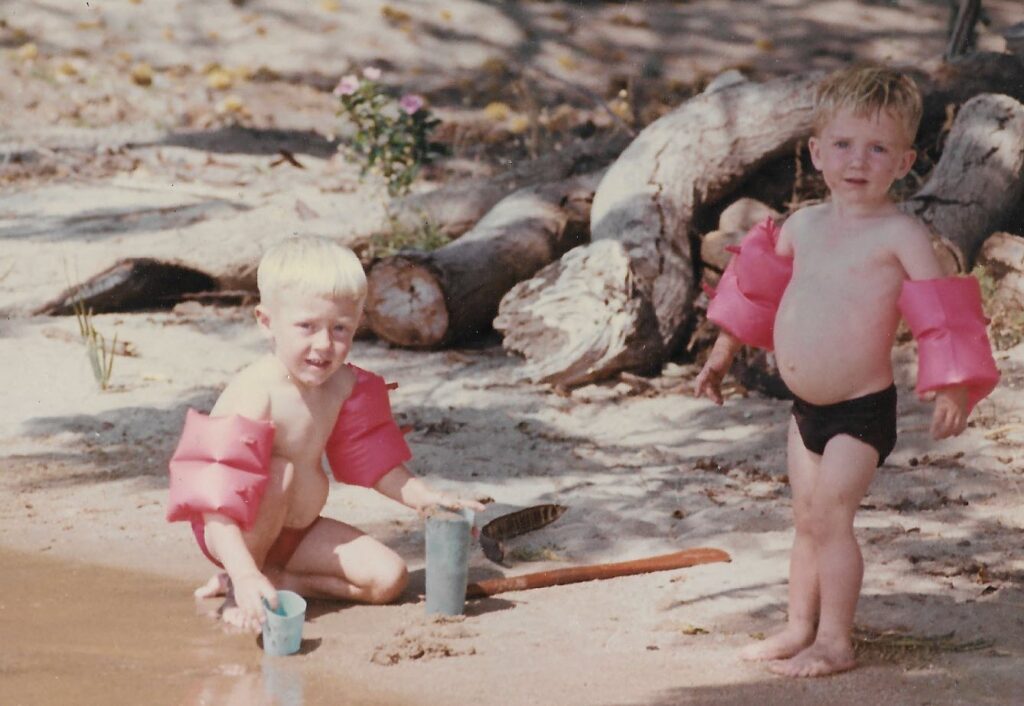
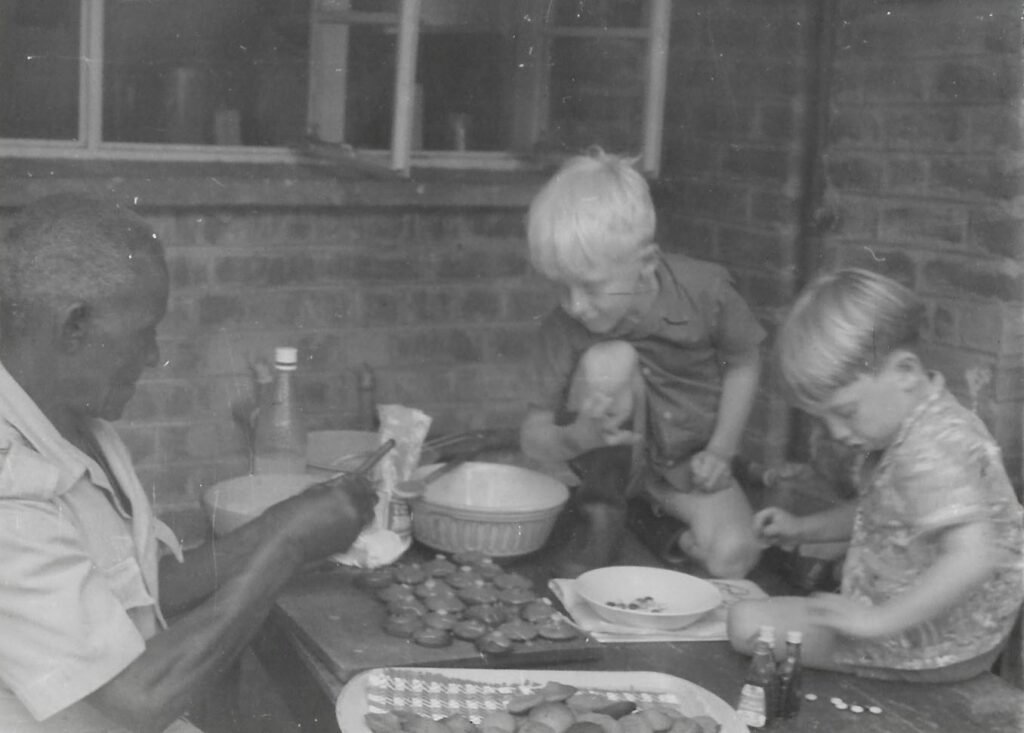
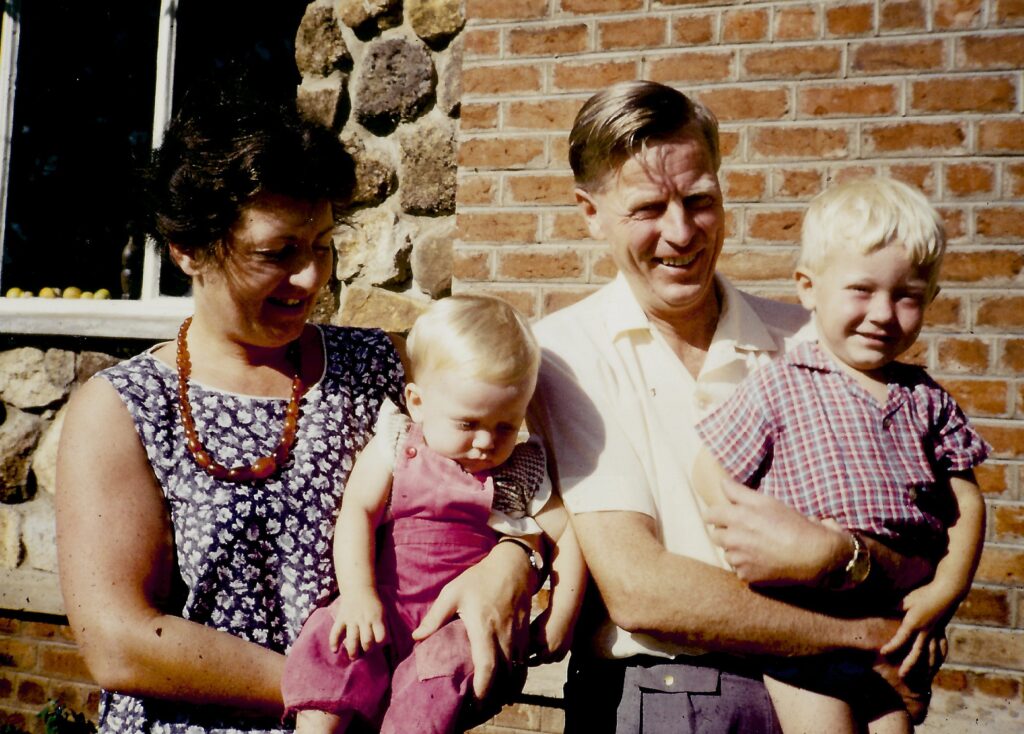
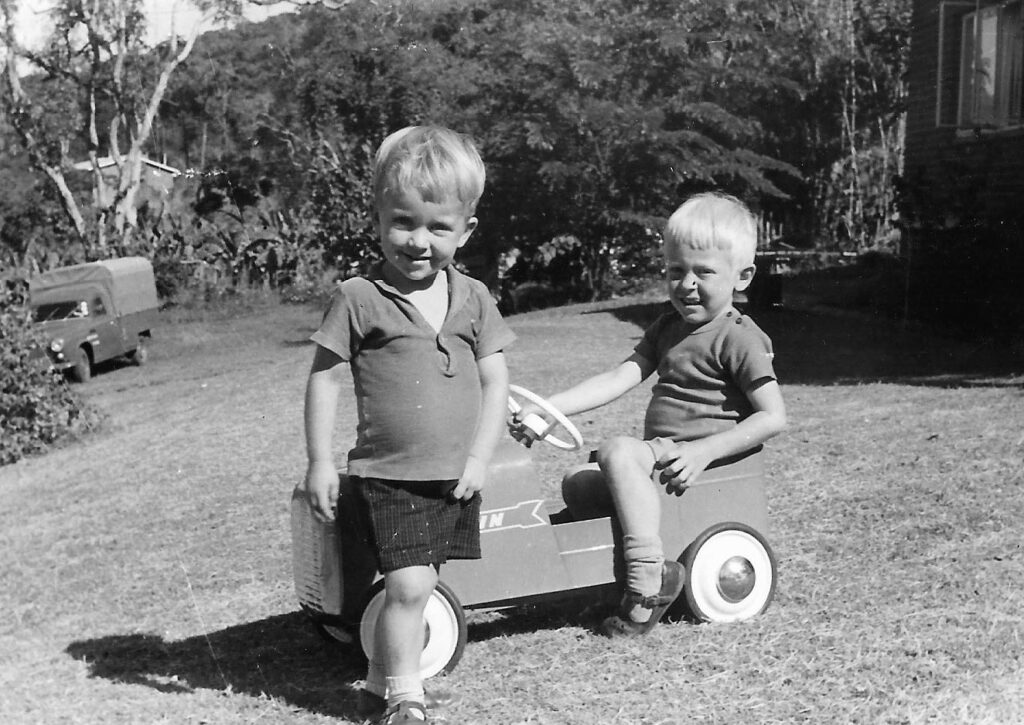
No snail ever crept more unwillingly to nursery school in Zomba than Basil when he began at Eastertime. Now he was going off as if he intended to enjoy it. Christopher – just on three – was enjoying himself rolling down the grass slope in front of the house and trying to catch pied wagtails. We felt they would be a little sad when the day finally came when he realised that a chap of his size and shape would never catch one.
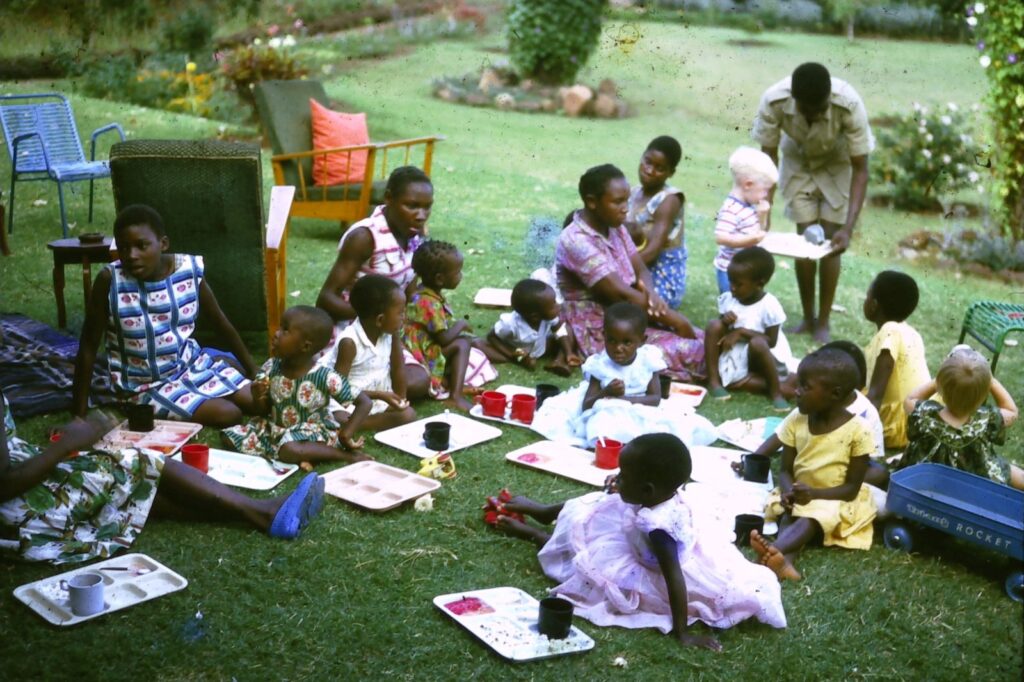
We have man-eating lions at present who leave paw-marks round the orange trees at the bottom of the garden. Jane says she will never forget the roar that vibrated through her from near the back of the house in the middle of the night. Hunters and traps containing a live goat, have been trying to catch them but they continue to rove uncomfortably close to the house. When Jane asked the night-shift telephonist who runs our wind-up mini-exchange, why he had not been on duty, she found it difficult to question his explanation, “I was on my way to take over the midnight shift, but I met a lion on the path and thought I’d better go home.” There was no challenging the regular chant of the little gang who were Basil and Christopher’s constant companions, “Mrs Arden, there’s a lion in your garden!”
Once again, Michaelmas, our wedding anniversary, found us at opposite ends of Malawi. I was on the hippie-deck (the focsle head) of the Ilala, wondering which of the happenings of a packed year were too boring (or too lurid) to find their way into our Christmas letter. The captain didn’t allow lights on the focsle head and you could dodge the mwera (the south-east trade winds) only by getting right inside your sleeping-bag. So making notes was out. At dawn, when the anchor chain clattered through the hawse-pipe a few inches from my right ear, I could recall only a few things strung together by the letter ‘B’ that I had thought of before dropping off to sleep:
Bees – the swarm that invaded Soche church where I had gone for their Easter Eucharist. Smoking them out with a burning car-tyre expelled the people but not the bees.
Burglars –On President Banda’s birthday, the police-catch over the past years is set free. Two came our way, one in the bedroom who beat Jane to the door by a short head while I slept, and a belated one who was still burgling when – unhappily for him – Elias, an athletic man who was cooking for us, came on duty.
Bush-baby – An entrancing little chap, all ears and bushy tail, silhouetted just after sunset on the roof of Lilongwe church.
Birds, boys and berries – We had a row of mulberry trees that grew exuberantly in the soak-away of the septic-tank. Any dark object seen in them about July was either a purple-crested turaco, a great purple-black bird with surprising pillar-box red underwings or it was Basil, Christopher and their friends, faces also a dark purple.
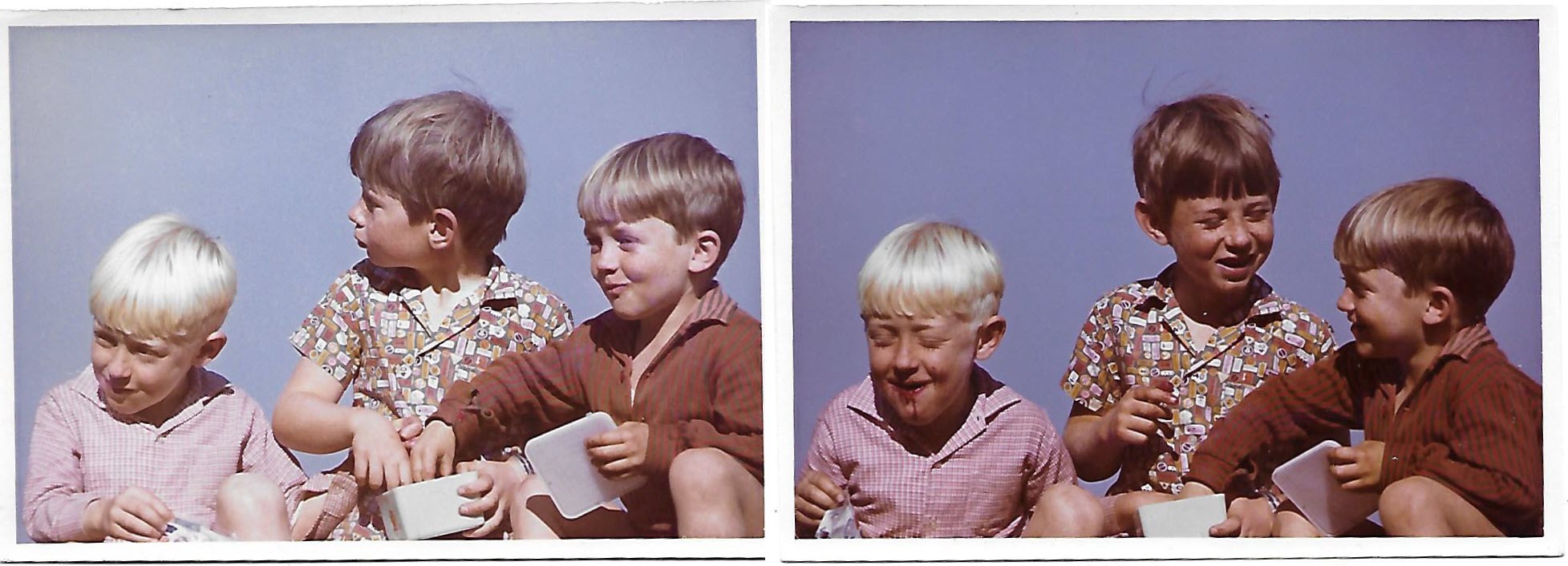
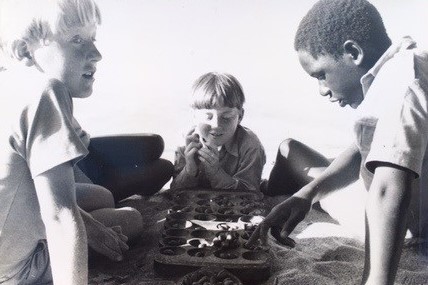
The new attraction at Kaphridizinja, the diocesan lakeshore cottage, was a four-foot crocodile, whose home base was half-a-mile from our beach. The Fisheries Officer was keen on the balance of nature and wouldn’t allow crocodiles to be exterminated. They were, we understood, being trained not to eat the wealthiest of the tourists whom Malawi was trying to coax to the lake, though they had recently taken one of our builders.
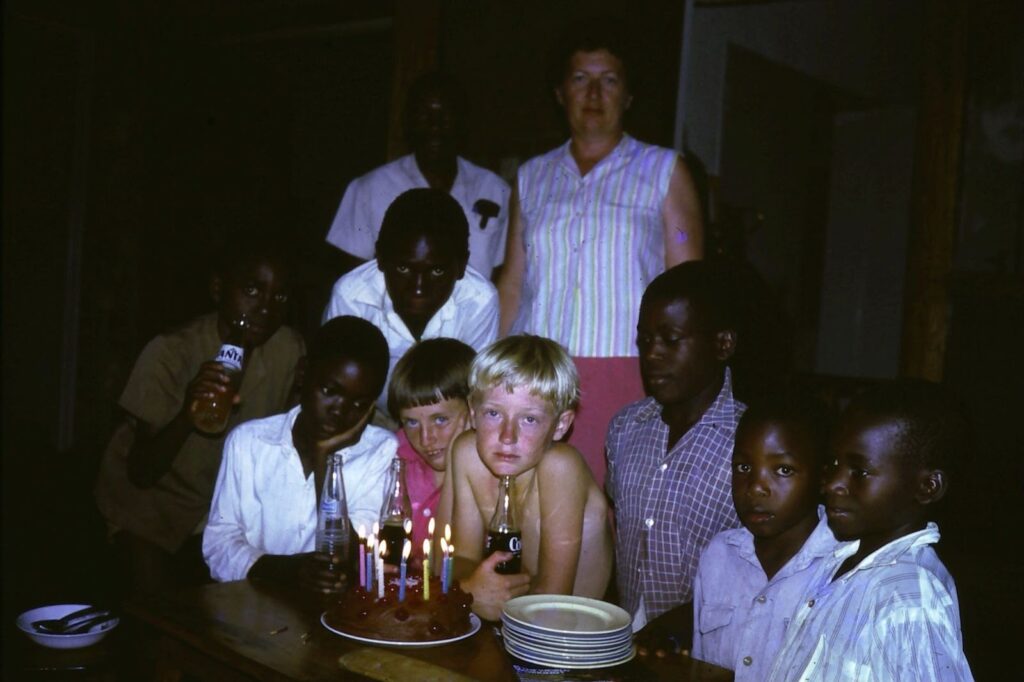
Basil, who has made so much progress in conquering his asthma as to be a different boy, is taking swimming lessons. Part I is apparently, “How to swim”, Part II “How to remain on top.” He has done only Part I to date, and operates like a whale, surfacing occasionally to blow.
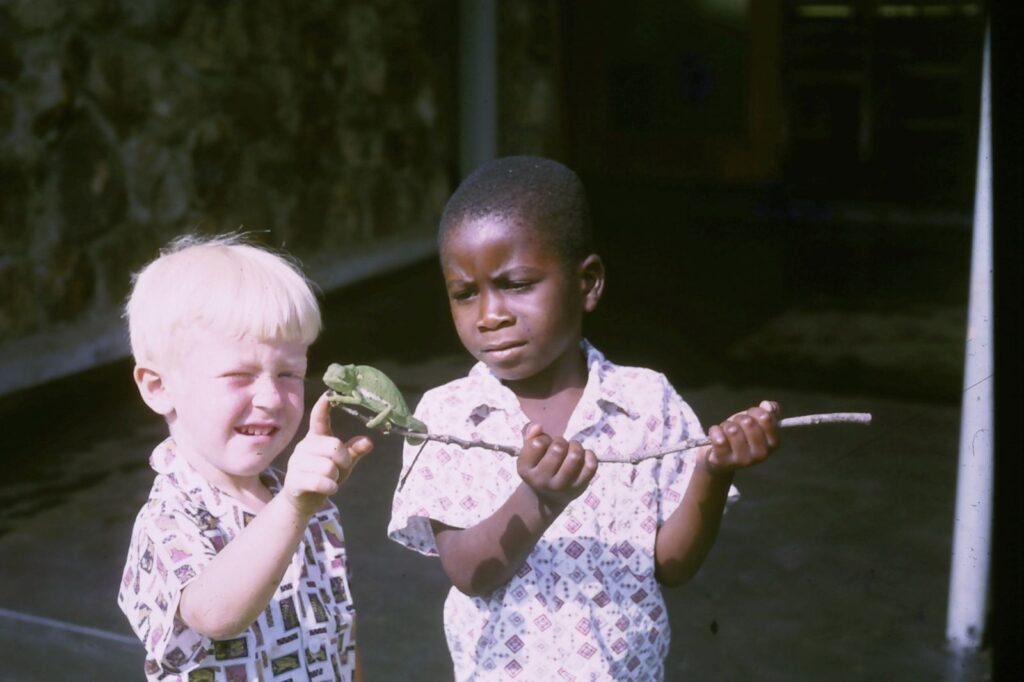
Kaphiridzinja, the Diocesan lakeshore cottage, like our garden at Malosa, has turned out to be a bird-paradise. Up to now, we have listed – as total amateurs – eighty-six species, and there are probably more to be identified. After sunset one evening recently, we watched for five minutes the display-flight of a pennant-winged nightjar, silhouetted against a vermilion sky. The nightjar migrates here from the Sudan and in the breeding season grows two-foot streamers from the tip of each wing. As he operates after dark you could bird-watch for a lifetime without seeing such a magnificent sight.
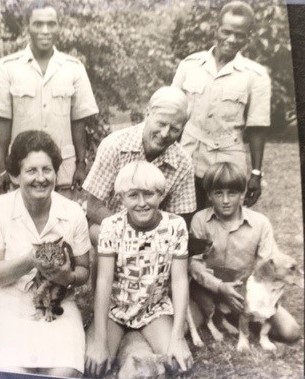
(Pets: Tigger, Ginger, Chips (nose) and Chambo)
For a wonderful ten-day holiday, Mel (my brother-in-law) lent us the Mirror dinghy he had made in his garage. I have an agreement with Jane that I will not tell you anything about the time she tipped me into the middle of the lake if she does not say anything about the time I tipped upside-down with an apprehensive visiting missionary nurse on board.
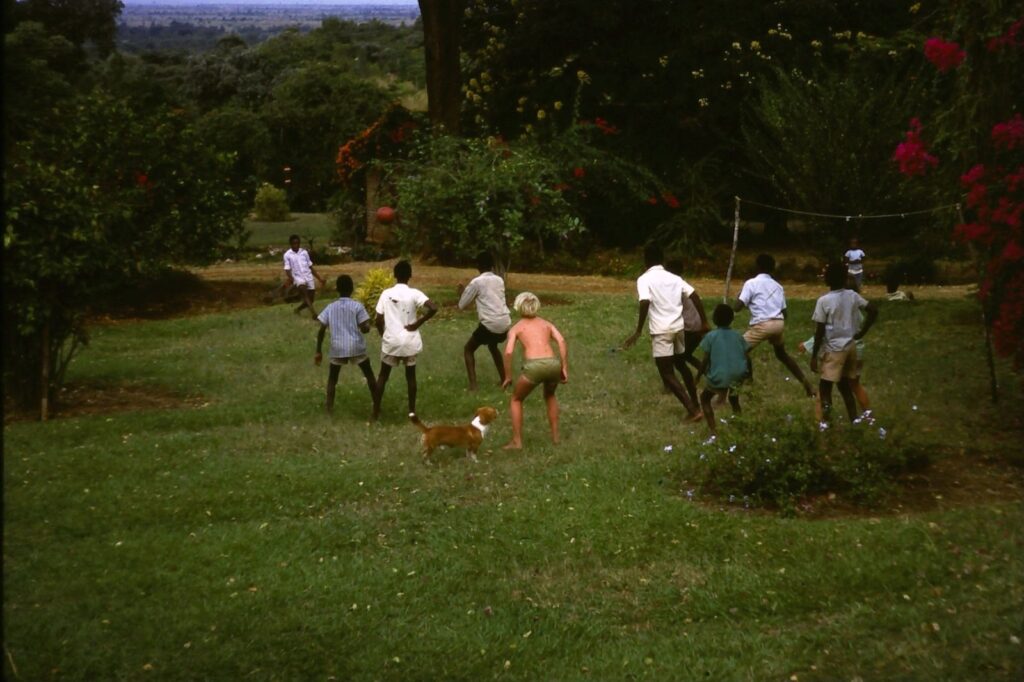
Close to where we met for Synod is the school where our two may have to go as boarders in a couple of years’ time. Our hearts bleed at the thought of exporting these two small shrimps (Christopher is still 3!) five hundred miles to be schooled.
